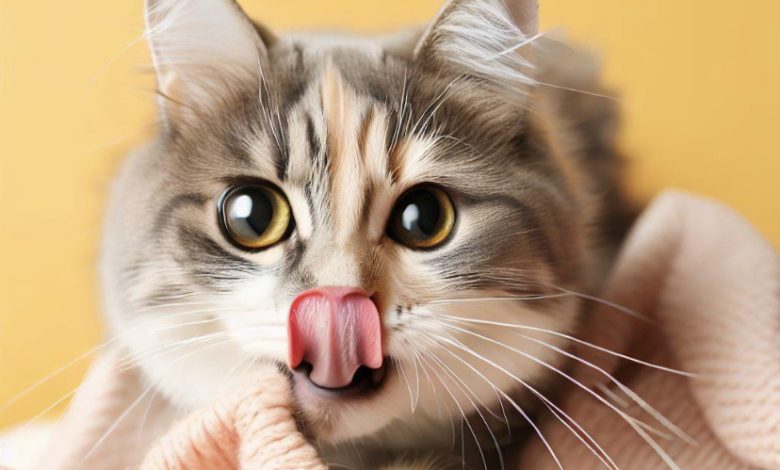Why Is My Cat Licking My Blanket?

There you are, cozied up on the couch, wrapped in your favorite fluffy blanket, and enjoying some well-deserved relaxation. Suddenly, you feel a tickling sensation, and you look down to find your feline friend fully engaged in an unexpected activity—licking your blanket! As your curious cat continues their grooming session on the fabric, you can’t help but wonder, why? well, you are not alone it happens to so many cat parents. In this article, I will teach how to stop your cat from performing the beha
Why is my cat licking my blanket?
Well, your cat may lick blankets for some reasons, such as comfort and security, territorial marking, boredom, or anxiety and nutritional Deficiencies. While occasional licking is harmless, excessive or obsessive licking may indicate an underlying issue and should be evaluated by a veterinarian. Embrace your cat’s unique behavior and provide appropriate outlets for their needs and well-being.
Comfort and Security: Snuggles and Licks
Okay, picture this: your cat curls up on your favorite blanket and starts giving it some tender licks. It’s actually a sign that your fluffy friend is seeking comfort and security.
By licking the blanket, they’re creating a cozy haven that smells like home, bringing them a sense of relaxation and familiarity. It’s like a soothing spa treatment for them, reminiscent of grooming themselves or their littermates.
So, if you find your feline companion kneading, purring, and giving those licks, they’re simply expressing their contentment and finding solace in your scent.
Also Read: Can Cats Eat Arugula? Let’s Find Out!”:
Territorial Marking:
We all know that cats are masters of marking their territory, but licking a blanket? Really? Yes, really! Cats have scent glands in their cheeks, paws, and chins. When they rub or lick objects, they leave their unique scent behind as a way of claiming the item.
So when your cat goes to town on your blanket with their tongue, they’re telling the world (or at least other cats), “This is mine, and I feel secure here.” It may seem odd to us humans, but for our feline friends, it’s a way of asserting their ownership and reinforcing their sense of security.
Boredom or Anxiety
You know what they say about idle paws—cats may resort to licking objects, including your blanket when they’re bored or anxious. Licking can serve as a self-soothing mechanism for them, helping to alleviate stress.
So, if you’ve been away for long periods or your cat lacks mental and physical stimulation, it might turn to the blanket as a source of comfort. Similarly, if your furry companion is dealing with separation anxiety or any other form of anxiety, licking can become a coping mechanism.
In such cases, it’s crucial to provide them with plenty of playtimes, interactive toys, and a serene environment to help minimize their anxiety and keep them happy.
Also Read: Why Cats May Attack Pregnant Women
Nutritional Deficiencies: The Quest for Missing Nutrients
Believe it or not, a cat’s blanket-licking extravaganza can sometimes be linked to nutritional deficiencies. Our feline friends require a balanced diet rich in specific minerals and vitamins.
If they’re lacking in any of these essential nutrients, they may develop a condition called pica, where they crave and lick non-food items like blankets.
If you notice excessive blanket licking or any other odd behaviors, it’s wise to consult with your veterinarian. They can evaluate your cat’s diet and recommend any necessary dietary changes or supplements to ensure they’re getting all the nutrients they need.
Best Food for Cats to Eat
Seeking Attention: The “Look at Me” Licks
Ah, the attention seekers! Cats have an uncanny ability to grab our attention when they want it. If your cat has discovered that licking your blanket elicits a response from you, they may continue this behavior as a way to demand your attention.
It’s their subtle way of saying, “Hey, I’m right here! Pay attention to me!” Although this behavior may not directly relate to the blanket itself, it’s crucial to provide your feline friend with plenty of playtime, interaction, and affection to fulfill their social needs. By showering them with love and attention, you can ensure they feel valued and content.
Also Read: Are Ringtail Cats Dangerous?
How to Stop Your Cat from Licking Your Blanket: Tips and Tricks
Is your furry little friend driving you bonkers with their never-ending blanket licking? Don’t sweat it! We’ve got some nifty tricks up our sleeves to help you reclaim your blanket and keep your cat’s tongue occupied elsewhere. Check out these awesome tips:
1. Provide Appropriate Alternatives: Cats are creatures of habit, so offering them a suitable substitute for your blanket can work wonders. Get them some interactive toys, a scratching post, or a cozy cat blanket of their own. Redirect their attention to these delightful options and watch the blanket-licking frenzy fade away.
2. Use Deterrents:: Just like humans have their dislikes, cats have their pet peeves too! Spritzing a pet-safe deterrent on your precious blanket can make it less appealing to your feline companion. Bitter apple spray or citrus-scented sprays often do the trick. Your cat will think twice before indulging in a lick-fest!
3. Make the Blanket Less Accessible: Out of sight, out of mind, right? When you’re not using the blanket, fold it up and tuck it away. Or designate a cat-free zone where the blanket can take a breather. Replace it with a cozy bed or another comfy spot that your cat can call their own. With a new favorite spot, they’ll soon forget about their blanket obsession.
4. Up the Mental and Physical Stimulation: A bored cat is more likely to resort to mischief, like blanket licking. Keep your furry friend entertained and engaged with a variety of toys, playtime sessions, and interactive puzzles. Tire them out with a game of chase or provide them with a stimulating environment that keeps their curious minds occupied.
5. Check for Underlying Issues: If the blanket licking persists or becomes excessive, it’s essential to rule out any underlying medical conditions. Allergies, skin irritations, or gastrointestinal problems could be the culprit. Consult with your veterinarian, who can provide guidance and ensure your cat’s health is in tip-top shape.
Why Does Your Cat Like Your Blanket?
We, humans, find comfort in our cozy blankets, and it seems our feline friends feel the same way. But why does your cat have a soft spot for your favorite fabric? Let’s explore a few possible explanations:
1. Comfort and Familiarity: Your blanket carries the sweet scent of home, making it a source of comfort for your furry companion. Curling up on your blanket and giving it some love through licking creates a sense of security and familiarity. It’s like snuggling up with a warm hug from you.
2. Texture and Sensory Delight: Cats are connoisseurs of tactile sensations. The softness and texture
Conclusion
The act of your cat licking your blanket can be attributed to various reasons, from seeking comfort and security to marking their territory, combating boredom or anxiety, dealing with nutritional deficiencies, or simply demanding your attention.
It’s essential to observe your cat’s behavior and take note of any changes or excessive licking, as it could indicate an underlying issue.
Remember to provide your furry friend with a stimulating environment, a balanced diet, and plenty of affection to ensure their overall well-being. Embrace their unique behaviors and enjoy the delightful companionship of your beloved feline friend!





Fantastic site Lots of helpful information here I am sending it to some friends ans additionally sharing in delicious And of course thanks for your effort